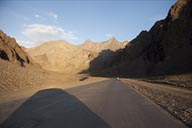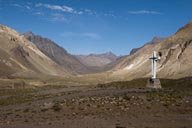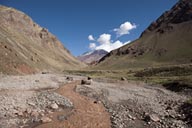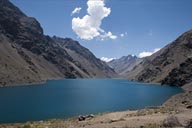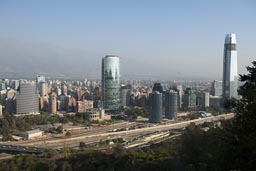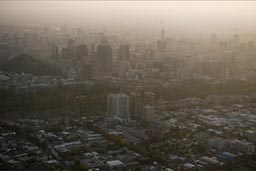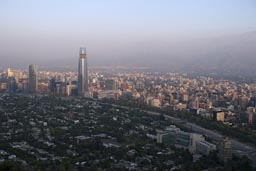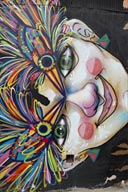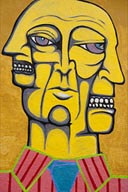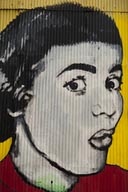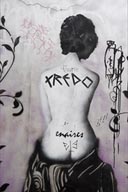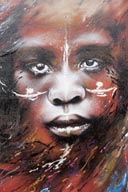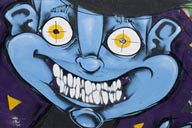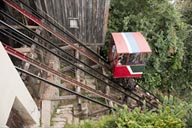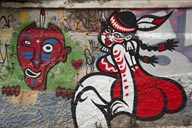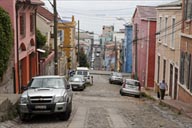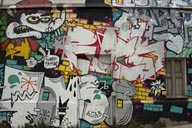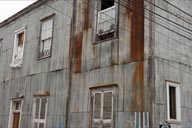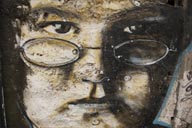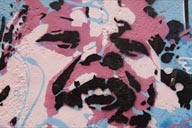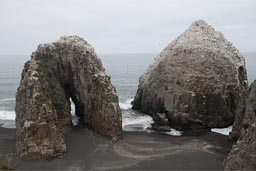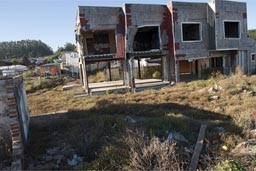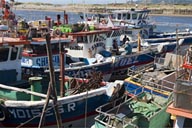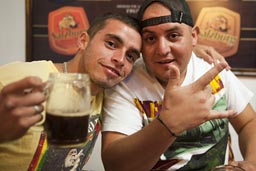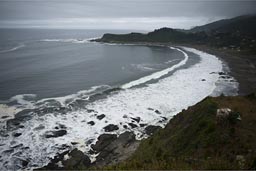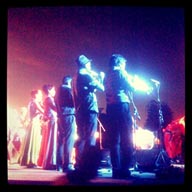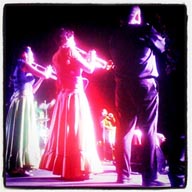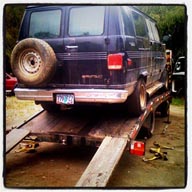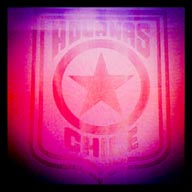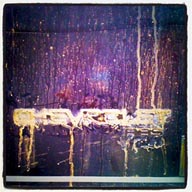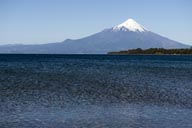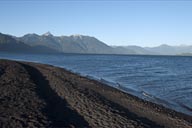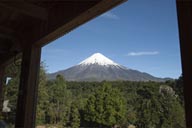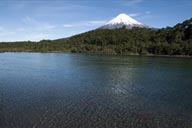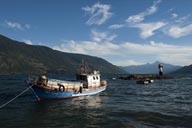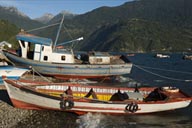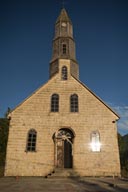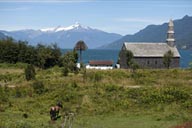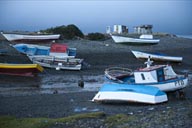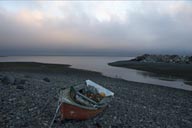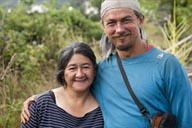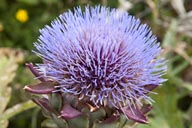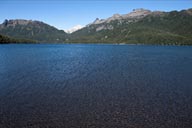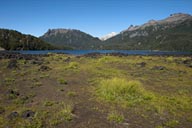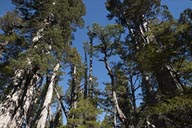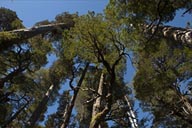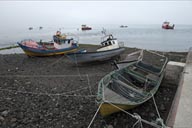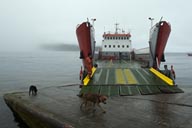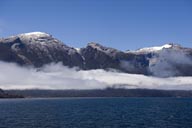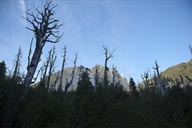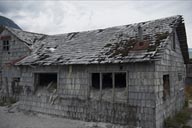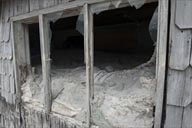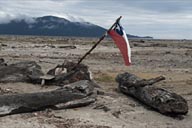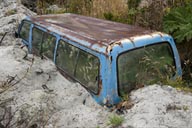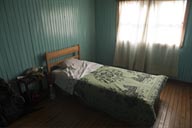www.thisfabtrek.com > journey > south-america > argentina-chile > 20130216-puerto-varas
The new year bird.
Download GPS (KML) track/waypoints.
Catching that bird that flies should prove hard, just as repairing my aging Chevy van, whose drive shaft broke on the last mile in the old year, and the latter threatens to bankrupt me at a fast pace that I have yet to come to terms with. The Gladiator van is like an old pal, it has come an incredible 64,000kms since Seattle WA with me, functioned as mine and my boys home for so long, just the cowboy that bit through the Bolivian and Peruvian Andean steppe, is tired, and I am reluctant to acknowledge that I am spending on a dying patient.
It always soldiered on, and it must hold now that the New Year bird flies into La Serena, on a bus though, and together we are headed south along the Chilean summer holiday coast, … in the good old Chevy like in the good old times.
Away from the masses and the windy sea is stinking hot Los Andes, and little moves where beer is never cold enough and after a night of talking over warm beer she and I split the first time.
Alone in the afternoon I wait long hours when my road east up to Argentina is closed, at night a pair of Chilean hitch-hikers buy me a sandwich until the late traffic jam on 3,000m asl unfolds and the lady in uniform sends me back repeatedly because I keep missing one of 5 border stamps.
Argentina's Puente de Inca, a pueblo, is shut at 8 in the morning like a subway station in the middle of night, and it is a horrible thought to go the day without a coffee, as the van's 12V water boiler broke upon the bird's arrival. A pair of retired Canadian hitch-hikers that I take to Aconcagua Park happily change me money and the lady in the boletería happily heats me hot water, even puts sugar and coffee in it, for free. This, my breakfast and lunch gets me through 9kms of walking in and out of the valley, and at the bridge where the sign instructs 'don't walk further unless you purchased a second ticket', and threatens 'don't risk consequences', I walk on for 1km as I know that rules are for suckers and mostly senseless. Aconcagua peak remains mostly behind clouds, 6,960m asl rises the Americas' highest and is sad like I.
On my return to Chile and Los Andes, some guys at night puncture all 5 tires (the reserve included), and maybe they messed with other stuff too as the van would never be the same again. Concluding rightly that somebody doesn't like me here, we leave and make it into Chile's capital, together, she and I, just.
It is summer in the city of Santiago de Chile and I sweat through the afternoon traffic jams with the engine cover open inside, it sputters constantly, sucks up dirt or water or just has electronic or ignition sync problems, all that can be said is the holiday mechanics cannot find the cause over the course of the week.
4 days into Santiago she and I split again, the second time, after a night of talking in the bars of Bella Vista, the bird is flying over.
There is a lavish pool, amidst high rise apartment buildings at the eastern outskirts, and for the first time Chile treats to nice food and great wines. On another Monday after Valparaiso and the graffiti and paintings, she and I split for the third time and I am headed south on my own in my battered Chevy van that doesn't want anymore and no more coffee making equipment. The last thing she says is 'don't put my name on your tabloid', the bird has flown out of my life again.
The end of the Chevy van, ...a diary of an impossible quest.
On leaving Santiago on Monday the most funny thing is that the van suddenly works after sputtering while going back to the mechanics for a whole week; nothing, now it seems, can disrupt my lone quest south, Patagonia, like a far-fetched dream is on my mind. I pass San Fernando and Santa Cruz, the Colchagua Valley, one of Chile's best known wine regions, and I head on and all I do is repair the tires, every day another one. From Licantén, midday, the sputtering is back and the last 50kms take me 5 hours to Constitución where I find a trustworthy mechanic. We take out the tank and fuel filter, to find nothing, we ultrasound clean the injection valves, the engine keeps sputtering, we remove the old air filter and the engine whirrs like new, so it's 'only' the air filter? Yeah, an African mechanic would have had it in 3 minutes. It takes another day to find a replacement and I take it easy, and drink some nice red reservas from Valley Central and Casablanca.
The 6th strongest ever recorded earthquake (8.8 on whatever scale) struck 2010 on a Saturday at 3 in the morning somewhere here off the coast, its tsunami set most of Constitución, also my garage, by a meter under water, on the island in the stream it washed away the campground. As I drive on south with renewed optimism I am passing the most affected region; between Copquecura, Dichato and Conceptión a lot still lies in ruins.
Without coffee in the morning I suffer, in Conceptión it drives me to buy what is called a Dakar-cup, supposedly to heat water through a 12V car charger, but it is a useless product, after 20 minutes I still cannot feel any heating taking place. The water heater that is not allowed to boil, for Angst of being sued, praises itself to stop the boil at 60ºC, just it never even gets half there. Who wants that? The legendary rally Paris-Dakar has been degenerating to a commercial lie since it left Africa, the Dakar-cup is fake, better when it says Dakar stay away, I abandon my new cup right on the parking, and disgruntled seek a thin Chilean coffee in a mall, and the promised internet doesn't work, and the plugs to charge the computer neither and I can't blame the earthquake for any of that!
But hey, – the Chevy runs again and I shake my head in disbelieve in light of its rejuvenated bite and acceleration, and it took only 2 mechanics and 4 days to find out that it was the air filter, isn't that development? Like the Dakar cup we make and market products that don't serve any purpose? So I reason and have no idea that my world as I know it is about to fall apart.
Conceptión's traffic and park wardens spit me out before I know it, further south I find peace on the wide beach of Lebu, which was hit hard too by the tsunami, and I bring my own beer, as there is no beer anywhere on a beach in Chile. No beer on a beach, unthinkable in Mexico, Peru or Ecuador!
It is Friday and till late I rush all the way to dark, cold Temuco, a center of today's Mapuche protests. Mapuche people are the proud indigenous inhabitants of south-central Chile, that for 300 years were never being subjugated by the colonizing Spaniards. Only in the 1880s Chile incorporated Araucania into its territory, killed many and incarcerate the remaining Mapuche in reservations, sending their numbers plummeting due to decease and starvation.
In the morning the van is still up and running and I reach Valdivia, one of the southern centers of German immigration (late 19th, early 20th c.). The strongest ever on earth recorded earthquake (9.5 on the scale) hit here in 1960, and the full horrors aren't entirely known, as communication, roads and infrastructure where largely non existent then in southern Chile.
This Saturday is beautiful, warm and sunny, rumors talk of a beer festival/fiesta de cerveza/Bierfest, I am in good mood, and yet absolutely nothing indicates that my Chevy Gladiator would not be able to ever drive again after here, after 1,500kms from Santiago. I find a cheap hostel with free parking and head out into the blue afternoon.
Kunstmann, throughout Chile is well known, and Valdivia best product, unfiltered Lager, Torobayo Ale, Bock and other specialty beers. Just the Oktoberfest in January is a bit of a complicated, rules heavy affair. To get your hands onto a Bier is a battle. It takes me an hour to find out how the system works, inside the tent everybody is drinking, just nobody sells beer for cash, you need puntos/points, but puntos aren't sold between 6 and 8, my watch shows 5:45. Maybe somewhere outside, someone hints, but man, I just struggled to get past the queue in front of the tent. Back outside I find the corner and queue to buy my puntos, then queue to buy my beer; it seems that somebody had an especially great idea and chilenos are too happy to accept. 'I have given up already, accepted I would not drink beer here' agrees the Australian in line next to me.
Rules, Germans, I feel exhausted, ... almost angry in face of the stupidity and I down what ever we bought in puntos with the Aussi, in Aussi speed, and never set foot inside the tent again.
In Chile, and this feel has been sinking in for a while, I have left Latin America behind me, somewhere 3,000kms in the north. The Spanish becomes ever harder to understand the further I reach south, and eating half well has become a lost cause, as avoiding BoneyM or Modern Talking (actually two German Disco bands when I was 15) being played along the meal.
Over the next week I would get to know Valdivia where German ancestry is worshiped, 'we are second in the world in bread consumption, after Germany', such pride is proclaimed not knowing that Germany actually is the country with the biggest variety of breads, some pretty good, some bad and ugly with the smell of preservatives, but hardly any that rivals Chile's weighty no-taste roll, pan amasado, 'worked bread' literally.
Valdivia hits with the real problem being food, again, the every day cheap food, and the senseless undertaking of going for lunch when every place has a roasted chicken leg on the lunch menu, and from the looks you know these chickens had the most miserable lives, were poisoned to death, and then killed with a sledgehammer, before angry cooks made sure using all their voodoo that all taste went up in smoke before the plate comes to the table, and no amount of salt or Chilean aji can revive it. Chicken comes with puree in one restaurant, with fries in the second, with rice in the third and with puree again in the fourth, what's wrong with Chile, the suffering asks?
You know the tough times have come down on you when you're hungry late in the afternoon, a minute away from the decision whether to skip food again altogether and go for beers only.
Prost!, because the beers are delicious in Chile and Valdivia especially: Ambers, Rubias, Negras, unfiltered Lagers and Ales from Salzburg, Kunstmann, Cuello Negra, and there might be more, so much beer culture when they cannot even fry fries?
Monday comes and as an en passant thing I have the alternator reworked, the incompetent has to consult another car electrician, then charges 100USD, and then when all is done, the engine sputters again. Why? First just a little and I make it to Salzburg brewery and drink with some American, Canadian, Swiss and German yacht-people and later with drunk Mapuche, beer is excellent, and named after the Austrian city.
On the hungover morning that follows and there's still no coffee, the Chevy is as weak as I, and soon refuses entirely. Down at Niebla and Las Molinas, at the Pacific coast where I take some foggy bay photos, only at full throttle and by flipping in the gear, I manage to get the van going and back into Valdivia, where on flipping in the gear again I break the automatic transmission. Now really nothing moves, all I can do is call a towing company.
There is a specialist in Valdivia, he speaks English, received training in Atlanta, he says he can repair it, but it would cost; he has an honest look and talk, he is Christian, has the bible next to him.
Such comes the great turn in the fab Americas journey and I take a few days to find a decision, the difficult one of what to do with the beloved van, who brought me all the way down from Seattle WA, over 66,656kms. The repairs have become expensive and many recently, somehow I have spent more time in the garages than on the road, I cannot see a point in throwing more money at it, the last bit, the break of the automatic transmission killed it.
The day comes, and the 'honest' US trained mechanic has already pumped off the 50 liters or 80USD worth of gasoline from my tank and put it in his car, when I confront him, he winds out, says he has no money in his pockets. Liar, we agreed I could leave what is in the van, just hoped for pocket money; blankets, pillows, mattresses, for the church he says, the heavy unused panorama photography kit, the unworkable, FinPix S3s, the amplifier, the radio, tools, straps, books and what else is in the van, the almost new 150USD battery too, he is going to use it, but winds out; what a wank' I think, fuel is almost currency equivalent. Really I don't have time for him, bad feelings neither, the creator will deal with this Christian git; it is safe to call him a thief.
As if the skies share my tristesse it rains when I leave the sleepy German immigrants town in a towing truck, the brave Gladiator in the back, on the way to Osorno customs. It is sad, like burying an old companion, but also liberating, I turn the page, open a new chapter and am exited what comes out of this very move in life. In Osorno, a friendly aduana official, with a completely deformed face handles my formalities, his upper lip hangs all the way over his mouth, the poor man has hard to be understood. Then it takes two hours to get the heavy van through the most narrow gate, only centimeters of space left and right and the progress is slow as we push it and tow it inside, like on a funeral procession nothing is rushed. Eventually it is over, 'Rest in Peace' old buddy.
In a taxi and a bus, then a collectivo I reach Puerto Varas, and feel liberated, and the costs of moving just plummeted to almost a fifth, but then I cannot stop when and where I want, and for the moment I carry more than 50kilos of weight, two backpacks and more, I don't walk far in this, I need to get organized. In Varas I stumble onto the right community of El Barista bar, beer is Morchela, a fresh unfiltered rubia shop artisanal.
Puerto Varas to Puerto Varas, Walking and Hitching the Careterra Austral.
Puerto Varas is nicely set on Llanquihue Lake, Volcano Osorno's glacial peak shines in the back, Puerto Varas, very German has the annual Kuchen Fest going to Bavarian brass and Dirndl. Food remains bad, half the pizza I feed the street dogs and they refuse, my whole plate of fish and chips I send back, the smell of old oil or fish or both is too much, I cannot even get myself to eat the fries, Chilean cooks in their enormous anger even mess up frying fries.
After a night till 4 in the Garage club, I start walking at 11 on Sunday morning along the southern shores of the lago Llanquihue. I leave all my stuff in the hostel, pack less than 10kgs, nothing but the most essential, camera, rain gear, sleeping bag, 'I'll return in a day or 2', I tell my French host. After 20kms I wet my feet, then take the bus to Ensenada, then walk on to Petrohue on lago los Todos los Santos, 30kms of walking in total. Volcano Osorno is so near, sun stands low over an immaculate blue sky and a wide volcanic, windy beach. There is a hotel, 250USD for the night, ufff! I take the ride over rio Petrohue, and the boatman overcharges me, but I say nothing. There is no beer in paradise, but the boatman knows the illegal stash, 1USD for an ice cold can of Escudo's, sometimes you know it's better to remain quiet. There are young people camping everywhere, somewhere is a hut, light inside, a clean queen-size bed in a single room is offered for 20USD, I enjoy my cheap cold beer on the front terrace with the most magnificent silent view onto Osorno volcano. And then comes what had to come, the mum of the house serves me the most delicious pan-fried trout filet I had in my whole life; large chunks of fish, nicely set on a huge plate, vegetables, rice and avocados placed around in nouveau cuisine style; after all my rants over Chilean food I had to meet my maker in the most uncommon of all places where I am the only guest in a wooden dining hall while the volcano shines in by the super-sized windows.
I am sure the angry cooks are on a roll molesting innocent tourists on the other side in the overpriced hotel while I go back to the stash and buy another cold Escudo beer for a dollar, my heals and soles hurt a bit but this seems to be my lucky trip, then I sleep and dream for 11 hours.
On a sunny morning after a coffee I catch a ride back to the junction, where I meet Slovakian Vladimir, together we catch a ride to Cochamó, together we have lunch and then dinner, together we hike inside Cochamó valley next morning, and are back for lunch for a delicious pan-fried salmon filet, again family style; amazing that whenever the mum of the house cooks that food is tasty. In the afternoon we catch together a half a dozen of rides till Contao, and we sleep in Vlad's tent, camping on the land of an old woman who cooks for us potatoes and spicy sausages and we have a liter of cheapest red wine, Exportacion, while she and her grayed frail uncle drink maté. And, given the old lady's long strong hair, I ask her, whether she is Mapuche, and she laughs and says this is an honor for her, but that most people around would take it as an offense. Next morning we are invited in for a huge breakfast and she happily shows off her herb and vegetable garden, her fruit trees, while her uncle and grandson busy themselves herding the cows out. They are more than self sufficient, also live off fishery, have almost no need for money, we pay what we deem appropriate, she has tears in her eyes when we leave, and we too.
The weather has turned a bit to rainy and we do a lot of walking on the coastal road that sees little to no traffic till past noon when we hitch a ride to Hornopirén.
We choose one of not many restaurants in a touristy town at the height of the season and food is terrible and beer overpriced, too hungry to think we've fallen into an angry cook's trap, and it hurts and I let it out on the owner 'you guys have no clue about food!' and Vlad is angry with me. At night we drown our differences in terremotos, on the 'food fair' as Hornopirén has a 50 years fiesta going. Terremotos are cheap white wine with pineapple ice cream and a shot of fernet; so you must not taste the wine. Chilenos like it sweet, like also their mote con huesillos, another famous drink invention, dried peaches in sugar water with sugar soaked wheat flakes, sweet, sweeter and sweetest. But we don't have it as it doesn't contain alcohol. Food wise we have Chilean ceviche and empanadas, it even tastes kind of good, after 4 terremotos.
Vladimir is gone the next morning when I wake up and I walk on my own the Hornopirén NP trail. On the trail I meet an old man and his wife, taking a rest as the path is steep and sun hot. He speaks German, 20 years they lived in East Germany, in Jena and Berlin, fled when Pinochet's killers gunned down his brother, a doctor, 'you wore a beard at the time, you were automatically suspect of guerrilla activities'. A bird shouts and he listens, 'you saw the river you crossed?' he asks me, 'for the first time in history the stones are layered with green algae, it hasn't rained in 2 months, the climate change, we destroy everything so we can consume'. No, I did not see the algae problem and yes, everybody laments the climate change in South America, and yes, I understand, but also I know too many people who still think Pinochet was God's blessing, as people were starving under Alende, after many years Chile has not found a common truth. As I step higher over rocks and roots I realize that walking these woods is free, and the best I have done in such a long time, and I am astounded by the beauty of the 50-60m high Fitzroyas and eventually the serene volcano lake, lago General Pinto Concha, on 900m asl where I swim naked and drink water at the same time.
Back in Hornopirén after dark after 25kms of walking and 18kms of hitch-hiking, I decide to poison myself at the local fast food joint with South Americas greatest invention, Salchi Papas, fried sausage and fries. So afraid to overspend and regret, I run into the open knife of the angry cooks, the already fried, then re-fried fries come uncooked but with the extra portion of old oil in it; they cannot even fry fries, and damned shall I be as I knew it and should have gone for beers only.
In the drizzle of the morning I take a ferry boat from Hornopirén south the fjords of the Los Lagos region, then a bus, then another ferry. I have joined the backpackers column that goes south all or part of the Careterra Austral, the road that traverses the wildest and southern most parts of Chile. At night I find myself stranded in Caleta Gonzalo which has only a campground, and I sleep on a wooden picnic table as I don't carry a tent. The cold drives me out well before sunrise and without coffee I walk 20kms, almost halfway to Chaitén, by around 10 I hitch a ride with a Pumalin Park ranger.
In Chaitén the rains start, and not so unexpected. Chaitén was almost completely destroyed by the lahar of the 2008 Chaitén volcano eruption, the lahar made the river chose a new path right through the center of town, hundreds of houses remain today filled up to the first floor with the ashen debris. It rains onto the ashen fields of desolation and somewhere where some guys had a drink they mounted a flag, a Chilean flag of hope and I go back to the El Quijote restaurant and it is closed so early Sunday, but the owner hands me a beer, while he brooms out the bar and sings loud to some Chilean folk, I like the vibes and have another beer while the internet is out of order, my phone without coverage, the backpackers and bicyclers and riders and camping caravans and 4x4 overlanders come and go, and the rains and storms come and go and come back again, and it seems the thunder storms want to finish off what the volcano left standing of Chaitén.
El Quijote surprises with pretty good pan fried salmon, but burgers, and completos, the great Chilean sandwich invention of mayonnaise and ketchup exuberance, are awful as my Chilean friend Andres points out. I wait for 3 nights and 3 days then take the ferry to Quellón on Chiloe island.
After fried eggs and chips in Quellón I take a bus through the rains and a ride to Cucao on the ocean. In a wooden hut on the river I eat some delicious fried empanadas with home made aji, for beer I have to back trek 1km to find it hidden away from the street and it costs almost twice as much as in Chaitén and I down one on the spot. Over the dunes I walk 3kms out onto the windy beach and in sight of the violent waves I celebrate my new life of walking and hitching receiving the cleansing from the horizontal rains and another beer.
A bus ride takes me to Castro, comfortable castle like capital of Chiloe with a shiny lemon yellow church. The room I find has never been simpler or cheaper in Chile, I skip food and drink beer, then meet three Chilean friends from the road for terremotos, and I talk more Spanish the longer the night lasts.
Via Ancud where I meet Finish and French friends from the road, and yes it all is a circle, I find myself at night back in Puerto Varas, two days have become eleven, and all my other baggage is still there, and the old crew is still there in El Barista, and beer is still Morchela, most delicious fresh unfiltered rubia shop artisanal.
Life is good when another 6 days later I take a bus to Bariloche in Argentina over the volcano cordillera and the graveyards of pale stumps of trees that reach motionless, but ready to break, for the blue skies, all suffocated in meters of ash, by recent and nearby eruptions. I am headed to Argentina for yet another appointment, with the famous bird.
The dream, the quest after the Chevy, Careterra Austral folk.
www.thisfabtrek.com > journey > south-america > argentina-chile > 20130216-puerto-varas

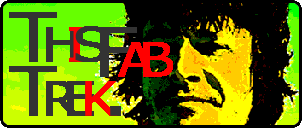
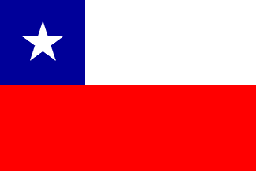
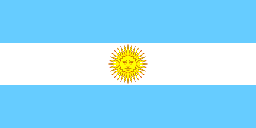
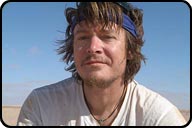
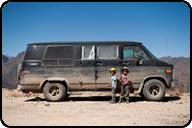
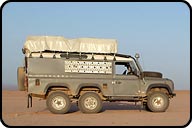

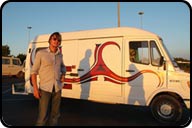
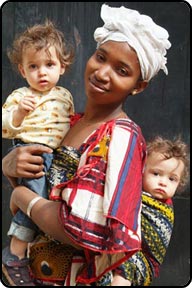
 contains Festival/Fiesta/Art photography.
contains Festival/Fiesta/Art photography.
